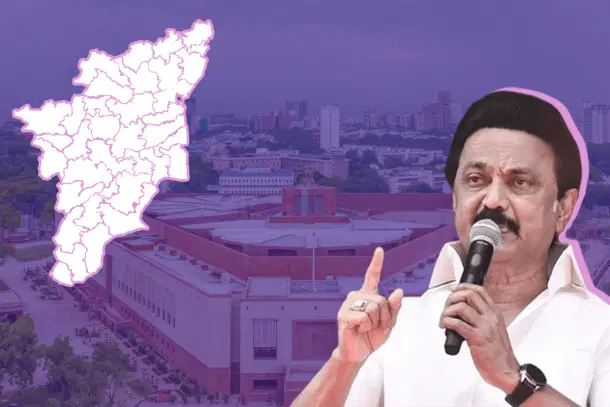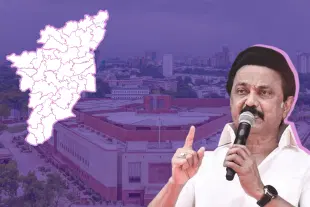Politics
Two Reasons Why DMK's Fear Of Delimitation Is Unwarranted
S Rajesh
Feb 15, 2024, 04:55 PM | Updated 04:55 PM IST
Save & read from anywhere!
Bookmark stories for easy access on any device or the Swarajya app.


The Tamil Nadu Assembly, on 14 February, passed a resolution brought by the Dravida Munnetra Kazhagam (DMK) government calling upon the union government not to go ahead with a delimitation process after 2026 based on the census.
Further, the resolution stated that if the number of seats were to increase, it should be maintained in the ratio of constituencies between the states as was fixed based on the population of 1971.
It was supported by MLAs of the All India Anna Dravida Munnetra Kazhagam (AIADMK) and the Bharatiya Janata Party (BJP) also.
The DMK, of late, has been opposing delimitation contending that it could reduce the number of seats for southern states in the Lok Sabha and thereby their bargaining power at the Centre.
This charge could also be seen as an extension of the 'north-south divide' politics, furthering a narrative that is already in circulation.
The resolution, therefore, does not come as a surprise.
There are two reasons though why the DMK's fears are likely to misplaced.
1. Current Balance Unlikely To Be Disturbed
Currently, the number of Lok Sabha constituencies per state is fixed as per the 1971 census, but the internal division of constituencies within the states is as per the 2001 census.
While we do not know which census will be followed in case delimitation does happen in 2026 (as the census scheduled in 2021 has not been carried out yet) and the latest that we have is of 2011, Prime Minister Narendra Modi has hinted that any new arrangement would not affect the south adversely.
Targeting the Congress at a rally in Telangana's Nizamabad in October 2023 during the campaign before the Assembly polls in the state, he used Rahul Gandhi’s 'Jitni Abadi Utna Haq' slogan (used in the context of the demand for a caste census), to say that if the principle were to be implemented southern states would lose out.
2. BJP Itself A Player In The South
Secondly, the BJP itself is a contender for power or a serious political player in most of the southern states and is unlikely to implement a delimitation that will make it difficult for its southern units to canvass support.
J P Nadda, the party's national president, recently said that his party had more presence in the south than the Congress, as the BJP had more Lok Sabha, as well as Rajya Sabha MPs from the region.
Also, irrespective of how many parliamentary or assembly seats from Tamil Nadu BJP holds currently, the Prime Minister has given enough indications that he seeks to establish his party as one of the poles of Tamil politics.
He has been making a number of efforts, consistently, to this end: promoting Tamil culture, organising the Kashi Tamil Sangamam, getting the Tirukkural translated in other languages, and participating in festivals like Pongal and Puthandu (Tamil New Year).
Given this, the government of India is unlikely to do anything that could hurt Tamil sentiments or give the DMK a chance to say that the union government is discriminating against the Tamils.
The DMK's fears over delimitation, thus, appear unwarranted.
S Rajesh is Staff Writer at Swarajya. He tweets @rajesh_srn.





